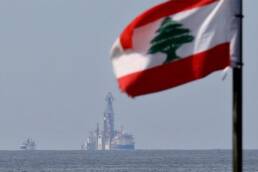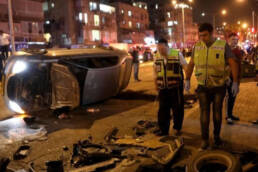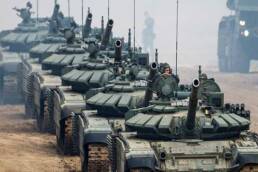Introduction:
The events that allude to the impact of the Russian – NATO war in Ukraine on the Russian – Israeli relations, and hence on the Russian – Israeli coordination in the Syrian arena, are getting repeated. this coordination is posing many worrying questions among the various regional parties concerned with the Arab – Israeli struggle, including Israel itself, about the nature of the Russian – Syrian partnership and its strategic ceiling, and the extent of the Russian commitment to defend the security of Syria, especially when it comes to the repeated Israeli aggressions on Syria, and on the nature of the relationship and limitations of the Iranian and Hezbollah roles that are acceptable for Russia on the Syrian arena, especially the roles related to the strategic confrontation with Israel and the strengthening of the axis of resistance in the region.
There were lately two major events witnessed on the Syrian and Russian arenas that encourage research on the extent of existence of serious indicators on the occurrence of changes in the Russian – Israeli relations in light of the Ukrainian scene, hence, the extent of the seriousness of an occurrence of changes in the equation that dominates the Russian stance towards the Israeli role in Syria, especially towards the military, security, and armament activities of Iran and Hezbollah on the Syrian territories. The first event was the use by the Syrian army of S300 anti – warplane missiles against an Israeli air raid on Masyaf on May 14, 2022, and the second being the Russian decision to stop the activities of the Jewish agency on all Russian territories on July 5, 2022.
Israel and the critical handling of the war in Ukraine
Few days after the launching of S300 missiles from the part of the Syrian army, following the targeting by Israel of a site in Masyaf, the Israeli Minister of Defense Benny Gantz rushed to provide reassurances to the Russian side that Israel did not go in Ukraine beyond supplying Ukraine with arms that are not aimed against Russia. This stance reflects the fear by Israel of Russia’s decision to breach the operational coordination rules between the two parties in the Syrian arena, including activating the S300 batteries in the hands of the Syrian army, to tke revenge on Israel for its stance regarding the Russian – NATO confrontation in Ukraine, which is in line with the US and NATO stance. This decision, if it was taken, would represent a precedence at the level of lifting the ceiling put by Russia for Israel’s military intervention in Syria, after Moscow in the past few years kept the Syrian skies open for Israel to direct strikes against Iranian and Hezbollah infrastructure in Syria.
The Sukhoi storm and the Russian – Israeli coordination
The return of the Russians to the Middle East formed a big opportunity and a strategic necessity at the same time, after the struggle transformed into a war for whose sake tens of thousands of Syrians and multi-national mercenaries were recruited and supplied with enough arms, money, and information to turn around the situation in Syria to the favor of the Western and regional power supporting this war that aims to change the position of Syrian in the regional and international polarizations, noting that this war that Syria, Iran and the resistance axis could not face alone due to the hugeness of the campaign and the human, military, financial, and intelligence capabilities mobilized for it. These challenges and risks offered an opportunity to support Syria’s resilience and ward off these risks through the deployment of Russian troops in Syria, and the return of Russia to the warm waters to protect the Russian gains in Crimea and the Donbass, and regain part of the old Soviet Union’s sphere.
On the other hand, and 10 days prior to the Russian operation in Syria on September 30 2015, the Israeli Prime Minister Benjamin Netanyahu, the Chief of Staff Gadi Eizenkot, and the head of Military Intelligence Herzi Halevi were putting together a framework of understanding and coordination with Russia in Syria, and the Israelis got guarantees for freedom of action to prevent transmitting arms from Syria to Hezbollah in Lebanon, and to protect the borders between the occupied territories and the freed Syrian Golan territories. In addition, Israel won the opportunity to direct preemptive strikes against potential operations directed from Syria against it, Russians’ approval not to introduce advanced Russian arms to Syria that could affect the balances in that country, in addition to containing Iran and competing with it over the major role in Damascus.
The Russian – Israeli coordination in Syria came to light the moment the Russian air fighters took off from Hmeimim airbase, and it has become a joint venture that enjoys an unprecedented security and political structure, that opens the window to transform it into a strategic partnership among a wide spectrum of the Israeli security establishment in light of the talks about the US pull out from the region. The coordination was founded on mutual understanding of the interests of both parties in the heart of Syria where war rages from all sides, and which is subject to a systematic destruction operation by a regional – international coalition supported by the US, Israel, Turkey, UAE, Qatar, Saudi Arabia, Jordan, and France.
The Russian – Israeli coordination in Syria included a hotline between the office of the Israeli Prime Minister and the office of Russian President Vladimir Putin in the Kremlin. In addition, it included a strategic group consisting of Nikolai Patrushev, Secretary of the Security Council of the Russian Federation, Meir Ben-Shabbat, Israel’s National Security Adviser and Chief of Staff for National Security, and Aiman Mansour, assistant of the Israeli National Security Adviser for Syria’s Affairs, who was the link with the Israeli tactical level, especially Unit 848 of the Israeli intelligence and its branches in the occupied Golan Heights. While on the Russian side, the tactical level included Hmeimim base, and the Russian Military Intelligence in Syria, which is considered as the highest level in the Russian tactical decision-making process. This coordination works on avoiding the clash in the skies of Syria between the Russian and Israeli air forces, and notify the Russians of Israeli operations in Syria half an hour before they are launched, in order to neutralize the S400 anti – airplane missiles deployed by the Russians around their airbase in Hmeimim, on condition of sparing the Syrian army any attack on its forces, in return of leaving the air space open to Israel to launch attacks against Hezbollah, the Iraqi Popular Mobilization Forces in East Euphrates, or against the Iranian bases or troops.
What did the security coordination achieve for Israel and Russia?
In addition to officially integrating Israel into the Syrian file, and under the cover of a tactical partnership with Russia in Syria and of acknowledging its security interests, the Israeli fighters and rockets waged an intermittent war against Iran, the axis of resistance, and the Syrian army, as part of the battle strategies below war, in order to bleed them in Syria which turned into battleground to prevent the axis of resistance from completing building its strategic deterrence along the Syrian front with occupied Palestine.
Between 2015 and 2018, the Israeli air force executed an average of 20 raids against the headquarters of the Syrian and Iranian Revolutionary Guard command units, artillery, arms and ammunitions warehouses, scientific research centers, arms, drones and missiles factories, and the centers of the Iraqi Popular Mobilization headquarters in Syria. In addition, it executed 26 raids in 2018, 23 raids in 2019, 39 raids in 2021, and 12 raids between the beginning of 2022 until May 2022.
The Russians endorsed the Israeli request to distance Hezbollah, and the Iranian Revolutionary Guards contingents 60 kms away from the ceasefire line in the Golan, in return for the Israelis and Jordanians to stop arming the Syrian insurgents in the liberated parts of the Golan and in Daraa, close the Amman operations headquarters, and facilitate reconciliations under direct Russian supervision. However, this request was not implemented as it meant to evacuate all Hezbollah contingents from the southern region and keep them in the suburbs of Damascus. Since 2018, Damascus reimposed its control on the region and disarmed the opposition groups, retook all strategic heights, and restored the air defense system that was destroyed by the opposition groups. Jordan expresses its protest against the retreat of the Russian control and its guarantees on the southern front, as was expressed by Jordanian King Abdullah II in Washington, considering voicing his concern that “the pull out of the Russians from the southern region contingent to Jordan would lead to putting it under Iranian control.”
The Russian coordination with Israel provided Tel Aviv with the opportunity to obstruct or delay Syria building its missiles force and air defense system, for despite Syria’s acquiring of S300 batteries capable of inflicting huge damage on the Israeli F16s in particular, however the Russian command used to make sure not to allow using them until few weeks ago.
Will Russian – Israeli relations enter a new phase?
It does not seem that the Russian – Israeli understanding will crack as a result of the Israeli increase of the escalation in Syria, as long as this escalation respects the ceiling of the Russian – Israeli understandings, and as long as it is limited to Israel targeting the military, armament, and security activities of Iran and the Resistance groups, which does not force Russia to defend the axis of Resistance against Israel in light of the developments witnessed by the world order since the 1990s after the collapse of the Soviet Union and the Socialist bloc, and the 1990 second Gulf War, which both had an impact on the balance of power in the Middle East, and on leading the Arab – Israeli struggle into a set of compromises that reached their peak with the normalizations witnessed between some Arab states and Israel under US sponsorship and wide international blessing that includes Russia, which does not place itself as a party in front of the polarization going on between the Palestinians and the Israeli occupation, and the Zionist project in the Middle East.
Any crack in the Russian – Israeli relations in Syria and in the Russian – Israeli relations in general, will not happen unless there is an Israeli involvement in the Russian – NATO war in Ukraine, and if under US pressures Israel supplies Ukraine with advanced weapons. It is noteworthy that Israel did not indict the Russian military operation in Ukraine, and stuck to its objectives not only to maintain the partnership with the Russians, but also to protect the coordination with Russia from the repercussions of any stance that it would take with regards to Ukraine that might anger Moscow. This is what has avoided until now with a US understating, in order to preserve its security interests.
#caus #center_for_arab_unity_studies #Russian-Israeli_coordination_in_Syria #Russia #war_on_Syria #Syrian_crisis
مركز دراسات الوحدة العربية
فكرة تأسيس مركز للدراسات من جانب نخبة واسعة من المثقفين العرب في سبعينيات القرن الماضي كمشروع فكري وبحثي متخصص في قضايا الوحدة العربية
We appreciate your support
SUPPORT THE CENTRE FOR ARAB UNITY STUDIES
The Centre is reaching out for its friends and readers for support, whether by ordering our publications and paying for them in hard currency, or through donations. The Centre welcomes any support to boost its resiliency, to ensure its survival, the continuation of its legacy and its commitment to tackle issues facing the Arabs and the Arab world.



